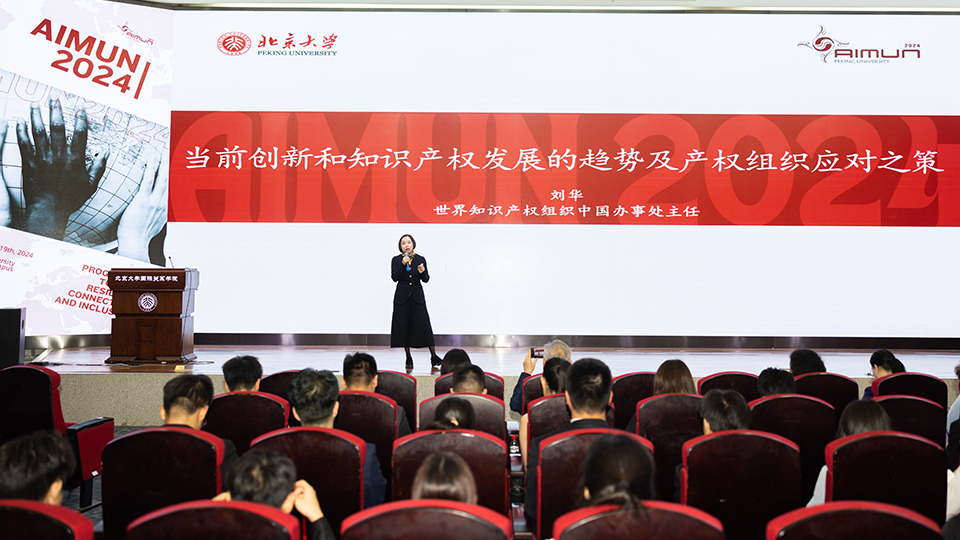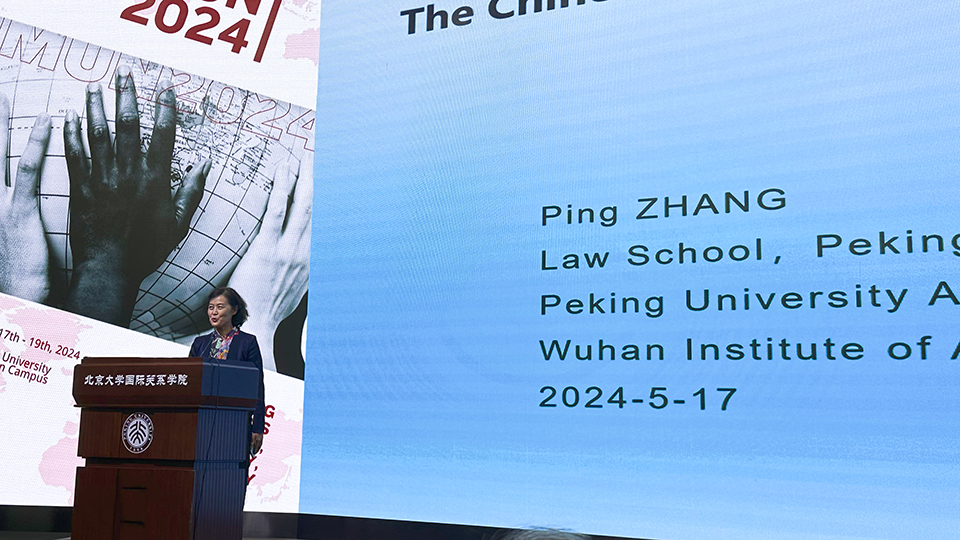WIPO China: Navigating the Future: Key Insights from AIMUN 2024 on Innovation and Global Collaboration
28 mai 2024
Beijing, May 17- The Opening Ceremony of Asian International Model United Nations (AIMUN) 2024, hosted by the School of International Studies of Peking University and organized by the Asian International Model United Nations (AIMUN), was held in Beijing. The event was attended and addressed by guests including Ms. Liu Hua, Director of the WIPO Office in China, Mr. Xu Hongcai, deputy director of the Economic Policy Committee of China Association of Policy Science, and Ms. Zhang Ping, Professor at the Peking University Law School.

Ms. Liu Hua highlighted the unprecedented changes occurring in the world due to the explosive surge of Large Language Models like ChatGPT4o and Ernie Bot, breakthroughs in quantum computing prototypes such as "Jiuzhang 3.0" and "Zu Chongzhi 2.1", and advancements in frontier technologies like brain-computer interfaces, humanoid robots, and synthetic biology. The rapid advancements in these technologies create new job opportunities and drive industry transformations, offering those with relevant knowledge and skills a broader range of employment options. Young students are encouraged to actively learn about these technologies, develop relevant skills, and prepare for future career challenges and opportunities.
She pointed out that the Global Innovation Index by WIPO highlights the transformative impact of the "Digital Age" innovation wave, driven by AI, blockchain, cloud computing, and big data, and the "Deep Science" wave, centered on biotechnology and nanotechnology. These innovations are reshaping production, lifestyle, and entertainment. The global innovation landscape is marked by three major trends: the eastward shift of innovation centers, enhanced exchanges and collaborations, and the increasing role of enterprises in driving innovation. Asia is particularly prominent in these changes, and the AIMUN event's focus on Asia aligns with current trends. Young students should pay attention to these innovation waves and consider integrating them into their own development. This will help them understand global innovation trends and provide abundant career opportunities, enabling them to better address future challenges.
When discussing AIMUN activities, Ms. Liu Hua emphasized the need for continuous innovation. She shared the "4C" key factors: comprehension, communication, consensus-building, and cooperation. She encouraged students to adopt innovative methods, integrating recent changes and two innovation waves, to enrich AIMUN content. Ms. Liu Hua noted that frontier technologies like AI can enhance AIMUN by more realistically recreating UN activities, providing prompt and accurate translations and data analysis, and fostering critical thinking skills. She stressed the importance of respecting cultural norms, solving problems, and promoting global cooperation. These efforts enhance the authenticity and educational impact of AIMUN, helping students address complex globalization challenges and cultivate international talents for the new era.

Mr. Xu Hongcai noted in his speech the global economy's new challenges and opportunities. He said the world economy is currently experiencing the dilemma of slow growth. However, global cooperation and technological innovation could lead to economic stability and progress. He believed that international events like AIMUN could encourage young people to take on responsibility and leadership for a better future.

Ms. Zhang Ping delved into China’s practices and international coordination of AI Governance. She highlighted the proactive efforts of countries worldwide in establishing governance frameworks for AI to foster its healthy development and enhance benefits for humanity. Whether in China, the United States, or the European Union, there is a shared acknowledgment of the necessity for clear regulations and policies concerning data usage and ethical reviews.
Ms. Zhang Ping underscored that the advancement of AI should not only amplify productivity and bolster decision-making efficiency but also mitigate potential risks such as deepfakes and misinformation. She urged the international community to collaborate in advancing global AI governance, with a focus on safeguarding the collective interests and rights of all individuals.
Following the addresses, Ms. Hui Yau, representative from the AIMUN Secretariat and Ms. Fei Dian, from Academic Team delivered their remarks. The opening ceremony was attended by approximately 300 student delegates, marking the official commencement of the Asian International Model United Nations 2024.
Asian International Model United Nations, hosted by the School of International Studies, Peking University and organized by Peking University Model United Nations Association, is a global conference aimed at university students. Since its inception in 2007, AIMUN has successfully held 16 sessions. AIMUN endeavors to embrace the diversity of viewpoints while showcasing the unique perspectives of Asia, fostering cultural exchanges, and exploring shared aspirations. The theme of AIMUN 2024 is “Progressing Towards Resilience, Connectivity and Inclusivity”.